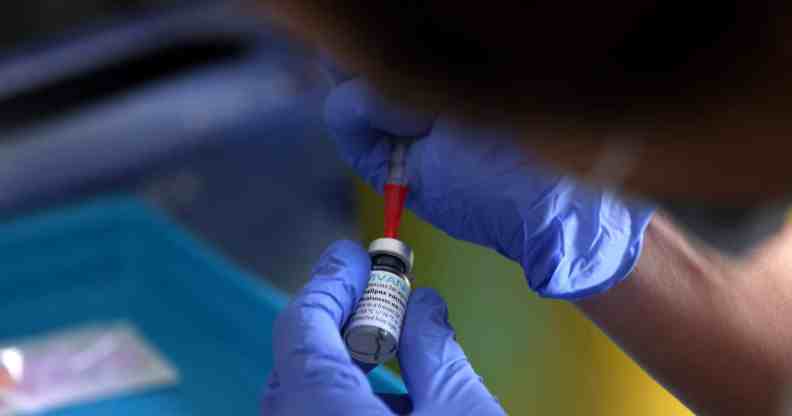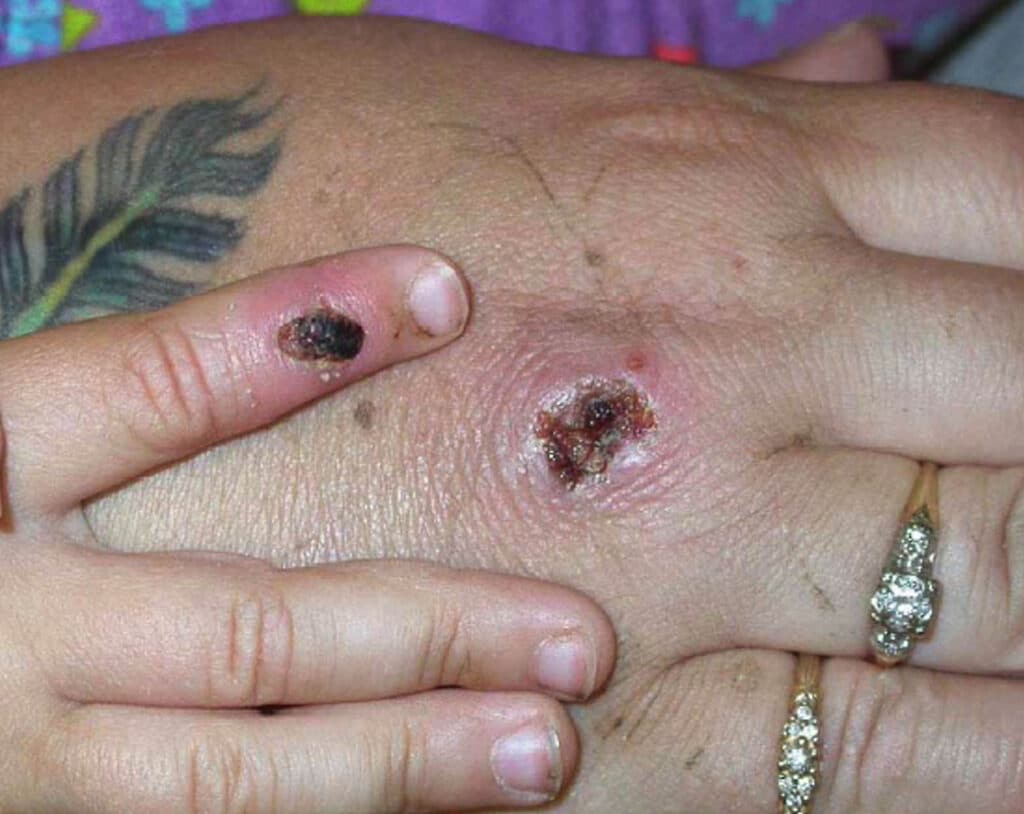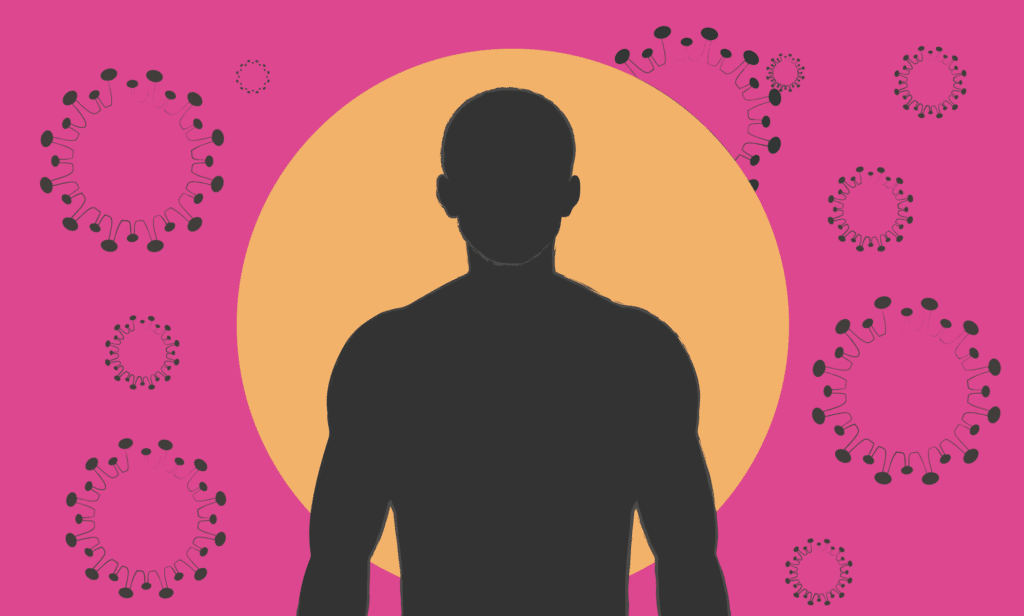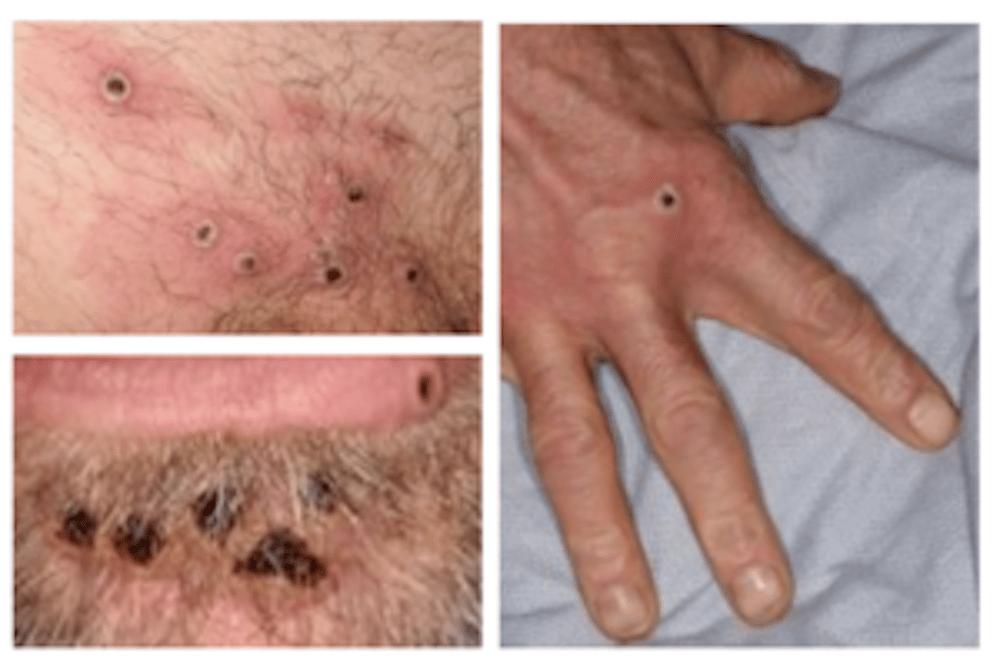UK monkeypox outbreak may be slowing down, new figures suggest as vaccines run out

A medical professional prepares a dose of the monkeypox vaccine in London. (Getty/ Hollie Adams)
Monkeypox infections in the UK may be slowing down due to the vaccine rollout, new statistics suggest.
According to data published on Monday (15 August), the UK is experience an average of around 29 new monkeypox cases a day from 1 to 7 August, compared to 52 average daily cases from late June statistics.
According to UK Health and Security Agency (UKHSA) incident director Dr William Welfare, this data “suggests the growth of the outbreak has slowed” – but he has urged the public to remain cautious.
“Please continue to be aware of symptoms, including rashes and blisters, particularly if you have recently had a new sexual partner,” Welfare continued.
The UKHSA said that its vaccination programme “should have a significant impact on the transmission of the virus”.
However, that programme will imminently grind to a halt, as the UK is on the verge of running out of doses. More will be delivered in September.

Monkeypox lesions. (CDC/Getty Images)
The UKHSA report showed that as of 10 August around 27,000 people in England had been vaccinated with a smallpox vaccine which also protects against monkeypox.
And 25,325 of that group are thought to be members of the LGBTQ+ community, specifically gay and bisexual men who have been prioritised for jabs due to the nature of the outbreak. The remainder of vaccinations stem from healthcare worker programmes or confirmed contact with the virus.
“UKHSA has secured one of the highest numbers of doses in the world to manage the current outbreak, procuring 150,000 doses for the UK from the global manufacturer of smallpox vaccines,” the report said.
Currently, at least 50,000 doses have been delivered to the UK, which the report said is the “maximum amount immediately available”.
The remaining 100,000 doses are due “later in September”. So far 40,000 doses have been made available to the NHS in England, with a further 6,000 allocated for Scotland, Wales, Northern Ireland, and the Crown Dependencies.
The remaining stock is yet to be allocated, but UKHSA has vowed to distribute it appropriately by the end of this week. These jabs are expected to go to those who have been identified as higher risk.
It has also promised to work with sexual health services to keep a record of those who are eligible, so once supply requirements are met, they can get vaccinated as soon as possible.
Sexual health boss ‘concerned’ by vaccine numbers
Ceri Smith, head of policy at the Terrence Higgins Trust, previously told PinkNews it’s “concerned” about the modelling the UKHSA has produced for its monkeypox vaccination plans.
“The plan is to vaccinate around 60,000 to 75,000 people in total, if you look at the number of vaccines they’ve ordered,” Smith said.
“But we, and the British Association for Sexual Health and HIV (BASHH), have estimated that we may need to vaccinate 125,000 people.” Each person requires two doses for maximum protection.

(PinkNews)
Monkeypox vaccine shortages aren’t unique to the UK – there is only one manufacturer making the jab, which is facing calls to open up its production process – but Smith was disappointed by the government’s preparedness, or lack thereof.
“We’ve missed the boat basically in terms of increasing the amount of vaccine we’ll be procuring, and this is something that we are very disappointed by,” Smith said.
As of 8 August, there have been 2,914 confirmed monkeypox cases and 103 likely cases spotted in the UK. Of these, around 2,883 are believed to be in England. London currently has the most significant rates of infection, with a total of 2,047 confirmed or highly probable cases.
UKHSA chief executive Dr Jenny Harries said: “The most important way to protect those who are more likely to get monkeypox and to limit the outbreak is to ensure that all the vaccines available to us are in people’s arms as quickly as possible and are building protection across the community.
“I’d like to thank all those who have isolated as part of this outbreak in order to limit transmission of the virus, the thousands of people who have come forward for vaccination and all those in the NHS and sexual health services who have ensured the rapid delivery of the available vaccine,” she continued.
According to current monkeypox guidelines on the UK government website, those who have come into close contact with the virus should self-isolate until they have not had a high temperature for at least 72 hours and no new lesions have appeared for 42 hours. All lesions must have scabbed over and there must be no lesions on the person’s mouth.

Monkeypox lesions. (UKHSA)
It’s also advised not to have sex during self-isolation and governing bodies recommend using a condom for 12 weeks after the first rash has scabbed over as research is not conclusive on whether monkeypox remains present in sexual organs.
Despite this, it’s important to note monkeypox is not currently categorised as an STI, despite what numerous misinformation campaigns have said, including Republican conspiracy theorist Marjorie Taylor Greene who has continually pushed the false claim.
British Association for Sexual Health and HIV (BASHH) president Dr Claire Desnap said: “It’s fantastic that thousands of vaccines have been delivered, we thank individuals in at-risk communities for stepping up to be vaccinated and services making huge efforts to get vaccines out. We have been advised that the next currently planned delivery of the vaccine won’t be available until late September.
BASHH is concerned about the time it will take to receive more vaccines and will continue to work hard with national agencies to make sure the next round of delivery is as smooth as possible.”

